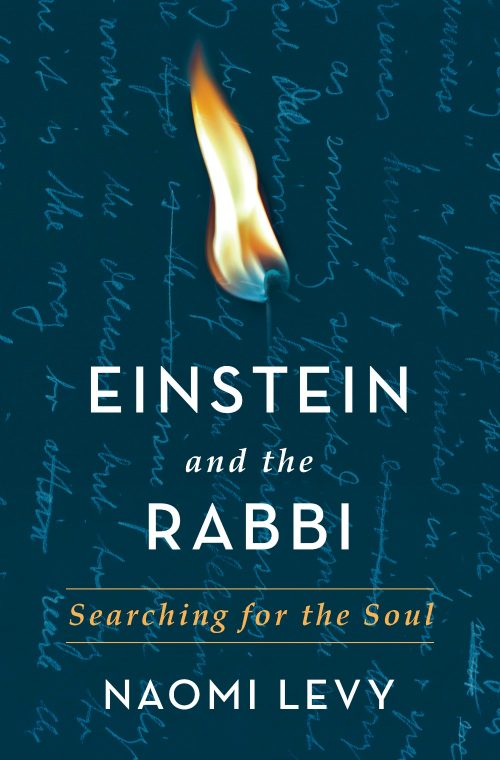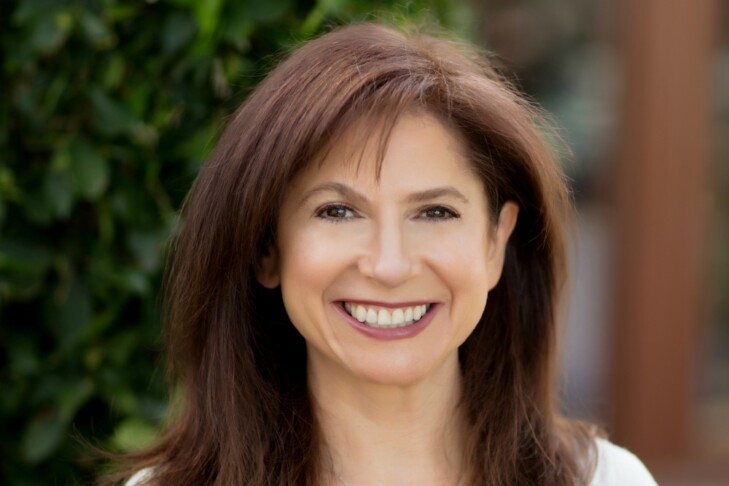In her new book, “Einstein and the Rabbi: Searching for the Soul,” Rabbi Naomi Levy teaches that the soul operates in our world on three levels—nefesh, ruach and nishama.
While each of these three words is a Hebrew synonym for “soul,” Levy describes nefesh as the first level of spirituality. It’s the place from where we journey to see the soul more expansively and to see our lives with more openness. Ruach, notes Levy, starts to teach us about our connections to the world—connections that include love and intimacy. Nishama, the third level of the soul, is like heat; one can feel it, but not see it.
“It’s the part of us,” Levy recently said in an interview with JewishBoston, “that is capable of prophetic vision. It is what Albert Einstein was discussing [in his letter to Rabbi Robert Marcus] when he referred to the unity of all things and the delusion of separateness. Einstein was saying that there is nothing but God. Everything I touch and see is only God.”
As the title of Levy’s book indicates, Einstein has top billing. The idea of writing about him first came to Levy after she read a snippet of a letter he had written to Marcus. Marcus was an army chaplain who had been among the first Americans at the liberation of Buchenwald. After the war, he escorted survivor children to an orphanage in France and a kibbutz in Israel. Levy, however, did not initially know that Marcus was a grieving father who had reached out to Einstein for succor.
Once Levy was aware of Marcus’s correspondence, she began to ponder why he wrote to Einstein. She opined: “In Marcus’s mind Einstein was the man who most understood the workings of God’s universe. Einstein was the man who transformed the way we understand the universe, time, space and matter. I couldn’t believe Einstein had written something so deeply spiritual. We associate dorm-room posters and formulas with him. But here is a man who spent his life trying to prove the unified field theory—that everything is connected.” Levy’s discovery not only added a new dimension to the story, but also sent her on a scavenger hunt for Marcus’s original letter to Einstein.
Speaking to Levy, one instantly senses how spiritual she is. She said she has always wanted to be a rabbi. “It was part of my DNA,” she mused. Her faith, however, was deeply challenged at the age of 15 when her father was murdered in a mugging in Brooklyn. She struggled to pray. “Many days,” she recalled, “I couldn’t recite certain prayers because they seemed like lies.”

It wasn’t until college that she realized the way she understood God was incorrect. According to Levy, God’s job description is not to prevent evil in the world. “We only start asking questions like, ‘God, where were you?’ after we experience a trauma,” she said. “We should ask that question everyday. If we do, instead of being angry with God, we can see God through new eyes.” Once Levy recalibrated her relationship with God, her faith deepened and strengthened. “Instead of hating, I started listening,” she said. “As soon as I did that I returned to my childhood dreams of being a rabbi.”
Returning to God has been the centerpiece of Levy’s rabbinate. She leads a unique congregation in the Los Angeles area called Nashuva, which in Hebrew means, “We shall return.” In her previous books, which include “To Begin Again: The Journey Toward Comfort, Strength, and Faith in Difficult Times” and “Talking to God: Personal Prayers for Times of Joy, Sadness, Struggle, and Celebration,” she exposes disenfranchised Jews to a more accessible Judaism.
Levy said: “I’ve always been drawn to Jewish outsiders. On tour with my first book, I kept meeting Jews who would never see a rabbi in a synagogue, but instead came to a bookstore. Nashuva came about as a desire to create something to draw Jews back to Judaism—to create something spiritual, soulful and musical. Some of the prayers we say, many of them written by me, were inspired by traditional liturgy.”
Levy’s faith was tested again a couple of years ago when she received a cancer diagnosis. She had gone to the doctor with what she thought would be the simple removal of a small basal carcinoma on her nose. The cancer turned out to be pervasive, and Levy had to have major reconstructive surgery. With that trauma came a disorienting role reversal in which she desperately needed the prayers she had recited over so many other people as a rabbi.
“As I used my own prayers, I realized that me from the past was here to comfort the me in the present,” she said. “I remember saying the verse from Hallel, ‘I called to God from my narrowness, and God answered from a vast expanse.’ I recited it over and over until I had reached a place of grace.”
Levy’s elegant teachings on finding and ultimately tending the soul in this world shed a new light on the connection between science and religion, theory and spirituality. After all, it was Einstein who declared that, “Science without religion is lame; religion without science is blind.”



